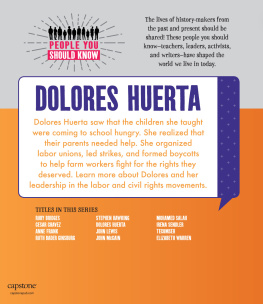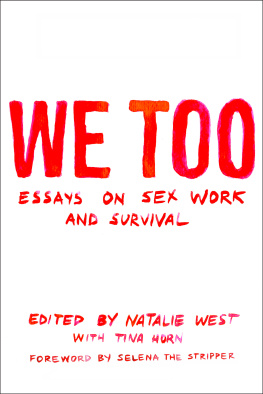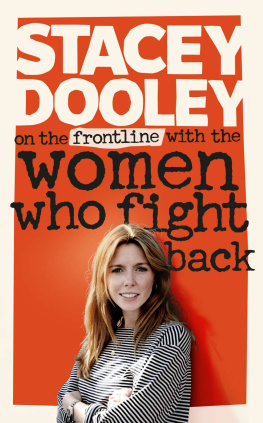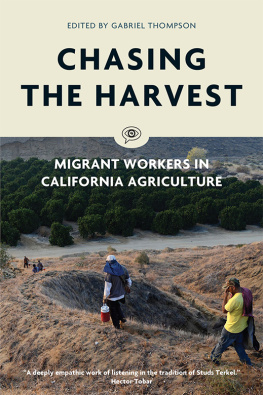Contents
Guide
This book is a testament to the power of collaboration. It emerged from years of teamwork, from the seemingly improbable scenario where journalists from various news organizations came together to produce long-form pieces for print, radio, and television, in both English and Spanish, on a topic that no one seemed to want to acknowledge or talk about.
The projects that resulted from this work, Rape in the Fields (2013) and Rape on the Night Shift (2015), were possible because organizations like UC Berkeleys Investigative Reporting Program, KQED-FM, PBS Frontline, Univision, and The Center for Investigative Reporting, where I work, came together to tackle challenging and resource-intensive reporting.
These projects serve as the foundation of this book, and my heart-felt thanks go to Linsay Rousseau Burnett, who originated this line of reporting, and to both Lowell Bergman and Andrs Cediel, who were crucial in initiating these collaborative investigations.
I am also forever indebted to the core reporting team from both projects: Daffodil Altan, Lowell Bergman, Andrs Cediel, Sasha Khokha, Hannah Mintz, Lauren Rosenfeld, Grace Rubenstein, and Nadine Sebai. It was a pleasure to work with professionals and humans of such exceptional caliber. I feel fortunate that in the process of poring over court records in our cubicles, shadowing night-shift janitors in Southern California, and embedding ourselves in the apple orchards of Eastern Washington, I have also found life-long friends.
I am also grateful for the editorial guidance we received in helping shape, refine, and vet the initial reporting on which a good portion of this book is based, especially from Judy Alexander, Raney Aronson-Rath, Ingrid Becker, Gary Bostwick, Andrew Donohue, Mark Katches, Isaac Lee, Tim McGirk, Richard C. Paddock, Susanne Reber and Bob Salladay.
It has been deeply rewarding to expand upon this reporting by writing this book, and I extend my sincerest thanks to zakia henderson-brown, my editor at The New Press, for giving me this opportunityand for offering such thoughtful and patient guidance throughout the process.
This book would not be possible without the moral support of my friends and family. I am especially thankful for my partner, Javier, whose encouragement and home cooking kept me fortified when I felt adrift in a tsunami of words and unfinished thoughts.
Last but certainly not least, I hold the deepest appreciation for the women workers at the center of this reporting. As a journalist, I am keenly aware that I serve as an intermediary to those who have critical stories to tell. I cannot thank enough the many women who have been so generous and brave in helping illuminate and humanize a long-buried problem. I stand in awe of their power and resilience.
About the Author
Bernice Yeung is an award-winning journalist for Reveal from The Center for Investigative Reporting. She was a 20152016 Knight-Wallace Fellow at the University of Michigan. Her work has appeared in the New York Times, Mother Jones, and The Guardian, as well as on KQED Public Radio and PBS Frontline. She lives in Berkeley, California.
The Southern California sky dims as Vicky Mrquez, one of Americas unlikeliest undercover workplace investigators, zooms southward along Interstate 5 in her Honda SUV. Syrupy Spanish love songs blast from her stereo as the GPS on her phone directs her toward a monotonous landscape of Orange County office parks.
Its a late winter day in 2015 and Mrquez is racing against rush hour, slowed by red brake lights before the traffic inexplicably speeds up again. She looks to gain seconds by dodging between lanes, swerving with inches to spare. Im kind of a crazy driver, she admits.
She is also on something of a mission. Mrquez works for the Maintenance Cooperation Trust Fund (MCTF), a little-known nonprofit with an unwieldy name and the pressing goal of fighting labor exploitation among janitors working the graveyard shift. That evening, Mrquez is on the road to the first of a half-dozen office parks that she will visit that night to make sure that cleaners are being treated fairly by their bosses. With her glasses, curled-under bangs, and pastel sweaters, Mrquez looks more like a retired librarian than a labor rights crusader. On tiptoe, she stands less than five feet tall.
Mrquez conducts surprise inspections in the heart of Southern California sprawl at least once a week. About a dozen of her coworkers are out doing the same throughout the state, but it is a job that few government agencies bother to do.
It is work that Mrquez believes in, a cause she has lived. For sixteen years, she worked as a janitor herself. She has a story that in many ways echoes what she hears from the women she meets during her undercover operations. She faced an economic dead end in her home country of El Salvador, which had endured more than a decade of war. She and her husband decided that one of them had to find work elsewhere to support their three children, and since Mrquez wasnt able to find a job at home, she was the one who made her way to California, where she had a niece.
When Mrquez arrived in Los Angeles, she didnt speak much Englishshe still doesntand for the first few months, she worked as a babysitter and then at a hair salon. She needed a steadier paycheck, so when someone told her about a job with a cleaning company, she took it. The work was rough, and she had to work more hours than she was paid for, but she managed to send some of the money back home. For a time, it was a necessary if imperfect solution. More than two decades have passed. Her children have grown up. She has made a separate life in Los Angeles, and now, toward the end of her working years, she has found a job that suits her.
After forty minutes of frenetic driving, Mrquez takes an exit toward the city center of San Clemente. Her target, a series of office parks, looms in the distance. During the day, these buildings are blinding in their blandness, but in the dark, they are almost beautiful in the way that they glow from within. Mrquez circles the parking lot slowly, observing. She pulls into a parking space near the building deepest into the office park and thrusts a stack of papers into a bulging black bag that she swings onto her shoulder as she climbs out of the car.
She tests the front door of the office building. She has arrived early enough in the evening that it swings open with ease, leading to a nondescript lobby and a bank of elevators. Its not always so easy to gain entrance. If the doors are locked, Mrquez has her strategies, which the organization she works for has developed over more than fifteen years of undercover work. She might, for example, station herself near the service exits or the dumpsters, where she knows the night-shift cleaners will eventually present themselves. In supermarkets or guarded high rises, she will sweetly ask for the janitor. If the person shes talking to wants to judge her by appearances and assume that shes looking for a job, so be it.
Tonight she walks into the building without delay, her heels click-clacking across the shiny tile lobby. Mrquezs first move is to look for bathrooms or supply closets, two places she knows she is likely to find a janitor. She moves past the elevators to a rear hallway, where she finds Mara Garca, a cleaner holding a mop next to a bucket of murky, citrus-smelling water.
Mrquez greets the cleaner brightly in Spanish. Garca is on the clock and she responds brusquely, almost warily. Mrquez knows from experience that every minute spent chitchatting means a later shift and a longer night. The inspector doesnt waste time on small talk. Setting her massive black purse on the hallway drinking fountains, Mrquez extracts a packet of papers that she passes to the cleaner. The investigator explains that she works for a nonprofit organization, the Maintenance Cooperation Trust Fund, which helps janitors make sure they get paid what they are owed and helps them solve problems with issues like immigration.
Next page




